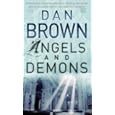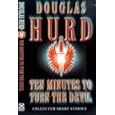 When a world renowned scientist is found brutally murdered, a Harvard professor, Robert Langdon, is summoned to identify the mysterious symbol seared onto the dead man's chest. His conclusion: it is the work of the Illuminati, a secret brotherhood presumed extinct for nearly four hundred years - now reborn to continue their bitter vendetta against their sworn enemy, the Catholic church.
When a world renowned scientist is found brutally murdered, a Harvard professor, Robert Langdon, is summoned to identify the mysterious symbol seared onto the dead man's chest. His conclusion: it is the work of the Illuminati, a secret brotherhood presumed extinct for nearly four hundred years - now reborn to continue their bitter vendetta against their sworn enemy, the Catholic church.In Rome, the college of cardinals assembles to elect a new pope. Yet somewhere within the walls of the Vatican, an unstoppable bomb of terrifying power relentlessly counts down to oblivion. While the minutes tick away, Langdon joins forces with Vittoria Vetra, a beautiful and mysterious Italian scientist, to decipher the labyrinthine trail of ancient symbols that snakes across Rome to the long-forgotten Illuminati lair - a secret refuge wherein lies the only hope for the Vatican.
But, with each revelation comes another twist, another turn in the plot, which leaves Langdon and Vetra reeling and at the mercy of a seemingly invincible enemy.
Again, a historic fact/fiction thriller with fascinating art symbols and a pacy story. Robert Langdon is an interesting character, as he is so knowledgeable about old symbols and art history, yet does not throw himself into any police action easily. Vittoria's appearance as Leonardo Vetra's adopted daughter and her involvement in sciences is also well developed. The stories surrounding Max Kohler and the Camerlegno, Captain Rocher and Captain Olivetti seemed somehow far-fetched, but what makes a good book is that the reader ís surprised and Dan Brown clearly surprised me in the book's final chapters. Again, however, I did not like the physical tension and attraction between Robert Langdon and Vittoria, as this is unfeasible and artificial...




